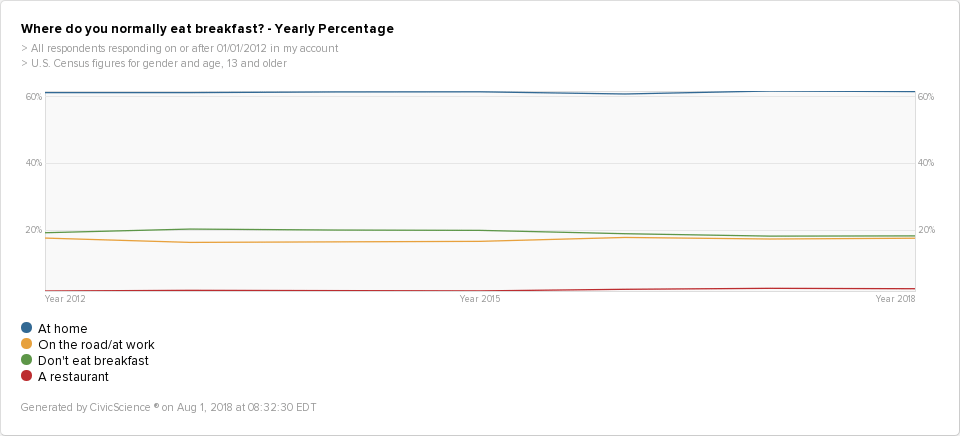CivicScience has studied trends in breakfast-eating for nearly a decade, encompassing the advent of things from Belvita Bars to Yogurt Flips to avocado toast. For sure, lots of things have changed. Companies like Post, General Mills, and Kellogg’s have suffered, as consumers moved further away from sugary cereals and Pop Tarts. McDonald’s only served breakfast in the morning when CivicScience first started studying it.
On the other hand, some things haven’t changed that much. The percentages of the 330,000 Americans (age 13+) we studied who eat breakfast at home, in restaurants, on the road, at work, or not at all has barely budged since 2011.
Take a look:
Look at just the 9,000 or so people surveyed in the past 90 days. 61% say they normally eat breakfast at home, 18% at work or on the road, 2% at restaurants, and 19% don’t normally eat breakfast at all.
So, who are all of these people? In studying the hundreds of profile attributes in the CivicScience database, several things jumped out.
A few findings were obvious: People who eat lunch at work or on the road tend to be older Millennials or Gen Xers because, well, they make up the majority of the workforce. The oldest and wealthiest respondents are the most likely to eat at restaurants. Kids age 13-17 are most likely to eat at home.
Women are slightly more likely than men to eat breakfast at home and men are much more likely than women to eat at a restaurant. Parents are more likely to eat breakfast on the go or at work – college kids seldom eat breakfast at all. People who eat breakfast out of the home are more likely to listen to streaming music, use social media, and use a mobile device for banking.
Lifestyle-wise, it’s crystal clear that eating breakfast of any kind is closely correlated with other areas of healthy living. People who follow health and fitness trends, take vitamins, read nutritional info on their food, or wear a fitness tracker are all much more likely to eat breakfast at all.
People who don’t eat breakfast are more likely to regularly drink clear spirits like vodka or gin (and to a lesser extent, drink alcohol of any kind), avoid the gym, and consider themselves to be addicted to their digital device. Perhaps counter-intuitively, the people who eat breakfast at work or on the road were the most likely of all groups to consider themselves overweight.
Finally, one correlation that jumped off the page was the relationship between eating breakfast (or not) and smoking cigarettes. Approximately 13% of U.S. adults still smoke cigarettes every day or most days. But, if you look at just those people who skip breakfast every day, the percentage of smokers leapt to over 23%. That’s nearly 1 in 4 breakfast-avoiders – or 4.4% of all Americans – who down a Marlboro (or the like) as their first meal of the day.









